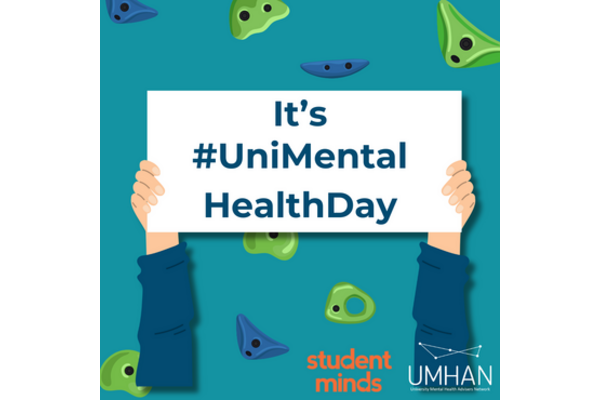'Our trusted access to their life and back stories'
What an amazing privilege we have as mental health mentors - to assist and get to know capable and resourceful (even if sometimes fragile) people - to see through three, or more, years of concentrated study, to become sometimes the first person in their family to achieve a degree. Many of us, I am sure, find a common rhythm and pattern to those three years which is identifiable across many of the students we work with. For young students the first year- unsureness, second year – finding their feet and identities, third year – blossoming further and moving on. For older students the sheer delight at returning to study – perhaps once a place they ran from – and achieving something, for some, beyond their wildest dreams. And our trusted access to their life and back stories which students choose to share with us; at times mesmerising, occasionally horrifying, but overall part of the vital individual jigsaw which are the makeup of all of us. Making our work constantly diverse, always fascinating and often challenging as we seek to find the best way to support an individual.
And yet what a conflicted role which, for myself, I know to be a stressful juggling act. In helping a student to work towards independent learning, greater coping and self-belief, I often wonder whether best practice may require us making ourselves gradually surplus to requirements, certainly in some instances? We help students build their skills and confidence to a unique and individual level of independence; to a point where they become more resilient, self-aware and self-reliant increasingly without us (whether that is across 1, 2, 3 or more years). In our current role (for many I am sure) a conflict arises when at the same time there is a practical need for us to ensure hours of work (within an insecure work contract where we are spot contracted only for each hour we work in direct contact with students). Then again, if a student is doing well and does not make contact, I am left wondering how they are, but aware that if I contact them I am questioning is that my need (to know? for enough work hours?) or am I meeting the student need and is it simply good practice or has their health taken a dip and they are simply not up to mentoring just presently and have taken themselves naturally away for a time? For me it’s a difficult set of ethical dilemmas and personal conflicts to steer through.
I had a similar experience working in mental health advocacy charities in the past, where the empowerment of people to speak up on their own behalf was paramount, thus rendering the need for an advocate to speak on their behalf only necessary where that could not be achieved. Accepting that there will always be those who would require the moral support and the walk-along-beside-me input, similar to the mental health mentor role. However, whereas in the previous roles I had a year or three year-round employment contracts, a desk, somewhere to ‘hang my hat’ and a group of surrounding colleagues with whom to daily bounce ideas or concerns off as necessary, this is in marked contrast to my current role as mental health mentor.
'We work in a substantial amount of role insecurity'
So, in this role of mental health mentor, requiring careful, sensitive and fine (sometime on-the-spot) inputs and calculations coupled with experienced intuitive assessments, we work in a substantial amount of role insecurity (often zero hours contracts), party to anxiety and an undignified – to me – process of work allocation (needing to be constantly alert for, and reacting to, new work ‘offered’ within some invisible, but competitive process between colleagues) and isolation (arranging our own work schedule and with no funding allowance for team support and more recently – in my case - for training). I recognise that some of what I describe may be particular to my experience alone, but I am sure that elements, at least, are shared with others.
If we were considering a student mentee’s presentation we would undoubtedly acknowledge insecurity, anxiety and isolation as risk factors for their mental health; especially if they were persistent and reoccurring features.
There are some interesting parallels for me with a recent Open University online course I undertook entitled Emotions & Emotional Disorders (part of my Continuing Professional Development and so self-sourced and undertaken in my own time - another conflict). It highlighted three indicators for depression as loss, humiliation and entrapment, and whilst I am not implying that these are part of the mental health mentor role, I do wonder where a slippery slope starts in terms of insecurity<loss, anxiety<humiliation and isolation<entrapment. In other words, questioning whether insecurity has some of its roots in sense of loss of security, whether anxieties around work allocation has the potential to lead to humiliation (especially when you are personally not successful having made repeated ‘bids’ for work) and whether isolation is some way along the road towards an entrapment of sorts.
'I have to say that I love the work'
Despite all of this I have to say that I love the work (another conflict) but acknowledge that I also am in a privileged position with a partner providing a secure income. The zero hours flexibility of the contract also enables me to carrying out a myriad of other joyful activities of my choosing (which help me sustain my mental health and well-being). I do, however, worry about especially younger people coming newly into the mental health mentor profession, whose only experience may be the ‘gig’ economy, plus those from counselling and therapy background where this way of insecure working has been around for years, especially for those in private practice. Concerns about mental health and wellbeing (for both students and staff) in the higher education sector are becoming ever more visible and acknowledged (for example the recent article). In our important and skilled work as mental health mentors should we not be raising the bar and calling for a secure and nurturing work environment whereby we can focus our mental energies and concentrate our skill development on supporting students. UMHAN recently have been asking us to input into how we feel that they could support us going forward. For me, the above I hope can be a starting point… ’a call from the floor’. What do others feel?
Kate Noble
Specialist Mental Health Mentor









